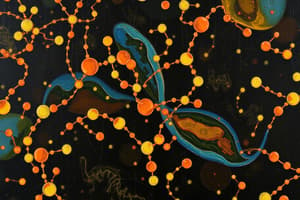Podcast
Questions and Answers
What is the role of biotechnological approaches in the pharmaceutical industry?
What is the role of biotechnological approaches in the pharmaceutical industry?
To provide innovative solutions for the treatment of various diseases.
Why is effective teamwork crucial in biotechnology projects?
Why is effective teamwork crucial in biotechnology projects?
To ensure projects progress smoothly and efficiently.
What are the primary responsibilities of a research scientist in biotechnology?
What are the primary responsibilities of a research scientist in biotechnology?
To perform experimental work and analyze data to advance research projects.
What type of groups are involved in working in biotechnology?
What type of groups are involved in working in biotechnology?
What are some of the organizational structures used in biotechnology companies?
What are some of the organizational structures used in biotechnology companies?
What level of education is typically expected for a research scientist in biotechnology?
What level of education is typically expected for a research scientist in biotechnology?
What is gene therapy?
What is gene therapy?
How do monoclonal antibodies (mAbs) work?
How do monoclonal antibodies (mAbs) work?
Give an example of a monoclonal antibody used in cancer treatment.
Give an example of a monoclonal antibody used in cancer treatment.
How has biotechnology contributed to vaccine development?
How has biotechnology contributed to vaccine development?
In what areas of the pharmaceutical industry has biotechnology made advances?
In what areas of the pharmaceutical industry has biotechnology made advances?
What role does biotechnology play in transforming the way we diagnose, treat, and prevent diseases?
What role does biotechnology play in transforming the way we diagnose, treat, and prevent diseases?
Flashcards are hidden until you start studying
Study Notes
An Overview of Medications Production in Biotechnology
The field of biotechnology encompasses a wide range of applications, including the production of medications. Biotechnological approaches have revolutionized the pharmaceutical industry, providing innovative solutions for the treatment of various diseases. This article delves into the intricacies of biotechnology, focusing specifically on its role in the production of medications.
The Importance of Teamwork in Biotechnology
Working in biotechnology involves collaboration among diverse groups of individuals, including chemists, biologists, pharmacologists, and structural biologists. Organizational structures vary, with some companies employing matrix organizations or focusing on specific therapeutic areas. Effective teamwork is crucial for the success of projects, ensuring that projects progress smoothly and efficiently.
The Day-to-Day Life of a Biotech Research Scientist
As a research scientist in biotechnology, one's primary responsibility is to perform experimental work and analyze data to advance research projects. This may involve operating laboratory equipment and instruments, interpreting test results using scientific software, and adhering to standard chemistry and molecular biology lab practices. Additionally, researchers are expected to have a bachelor's degree and typically gain experience through related work or research assistantships. The role of a biotech research scientist can be found within various sectors, including academia, government, pharmaceuticals, biotechnology companies, or research institutions.
Biotechnological Advances in Medications Production
Biotechnology has significantly impacted the development of medications by enabling rapid advancements in drug discovery and delivery systems. One notable example is gene therapy, which involves introducing functional genes into a patient's cells to treat genetic disorders or diseases caused by missing or malfunctioning proteins. Gene therapies have been developed for conditions such as hemophilia and some types of cancer.
Another area where biotechnology excels is in the production of monoclonal antibodies (mAbs), which are antibody molecules that recognize specific antigens. These highly targeted agents have revolutionized the treatment of certain diseases, such as cancer and autoimmune disorders. They work by either directly targeting tumor cells or blocking the activity of disease-causing pathogens. For instance, Herceptin (trastuzumab) is an mAb that targets breast cancer cells expressing the HER2 protein, while Humira (adalimumab) inhibits the inflammation associated with rheumatoid arthritis and other autoimmune diseases.
In the field of vaccines, biotechnology has played a pivotal role in combating infectious diseases. Vaccine platforms such as nucleic acid vaccine technology, viral vector technology, and recombinant protein technology enable the rapid development and mass production of novel vaccines against emerging threats like COVID-19.
The pharmaceutical industry continues to benefit from biotechnology advances, particularly in the areas of gene editing, synthetic biology, and targeted drug delivery. These innovations are driving the development of new therapeutics, offering hope for patients suffering from complex medical conditions.
Conclusion
Biotechnology plays a crucial role in the production of medications, transforming the way we diagnose, treat, and prevent diseases. As our understanding of biological processes continues to evolve, so too will the applications of biotechnology in medicine. The future holds immense promise for this dynamic field, with new discoveries and breakthroughs on the horizon.
Studying That Suits You
Use AI to generate personalized quizzes and flashcards to suit your learning preferences.




